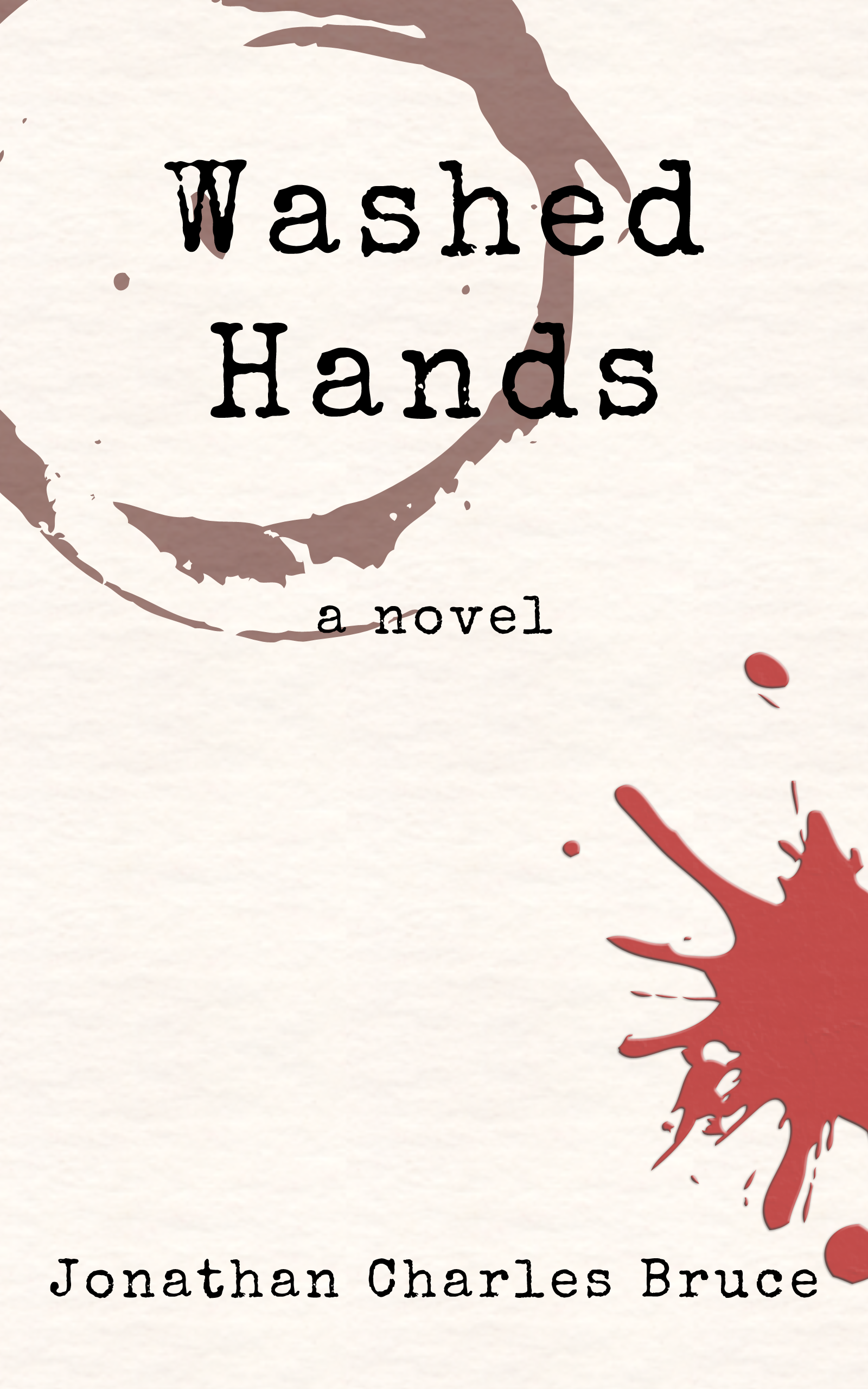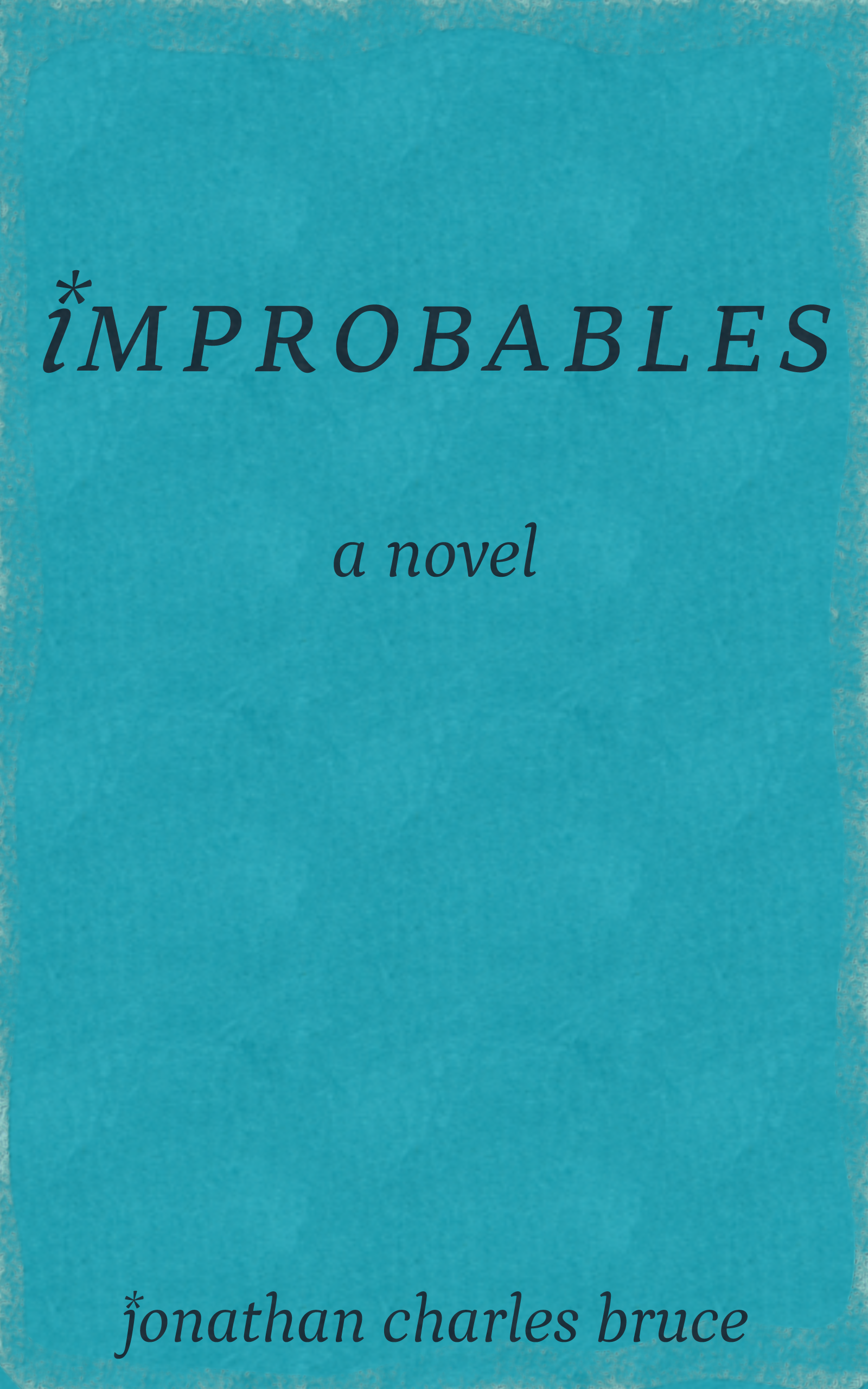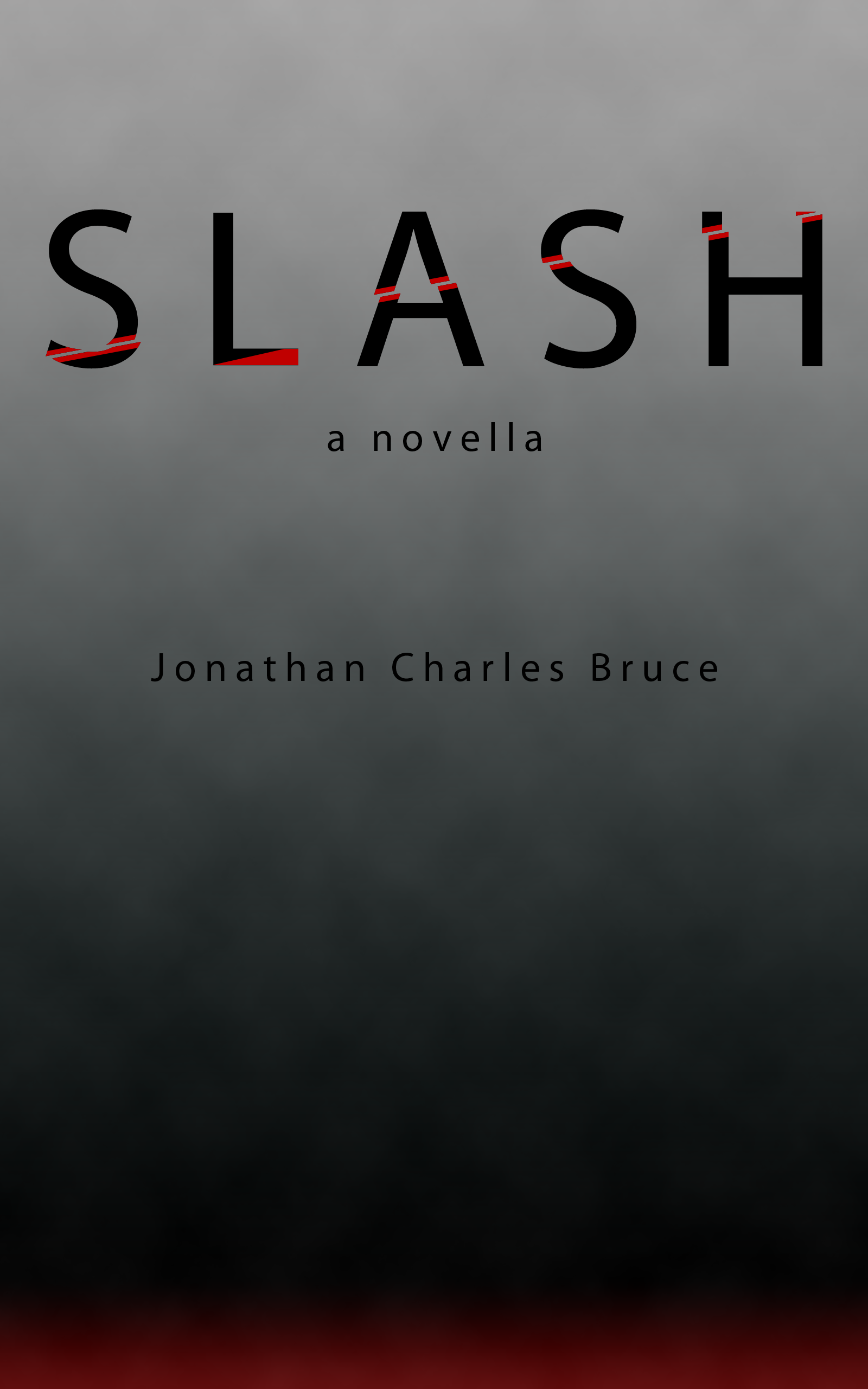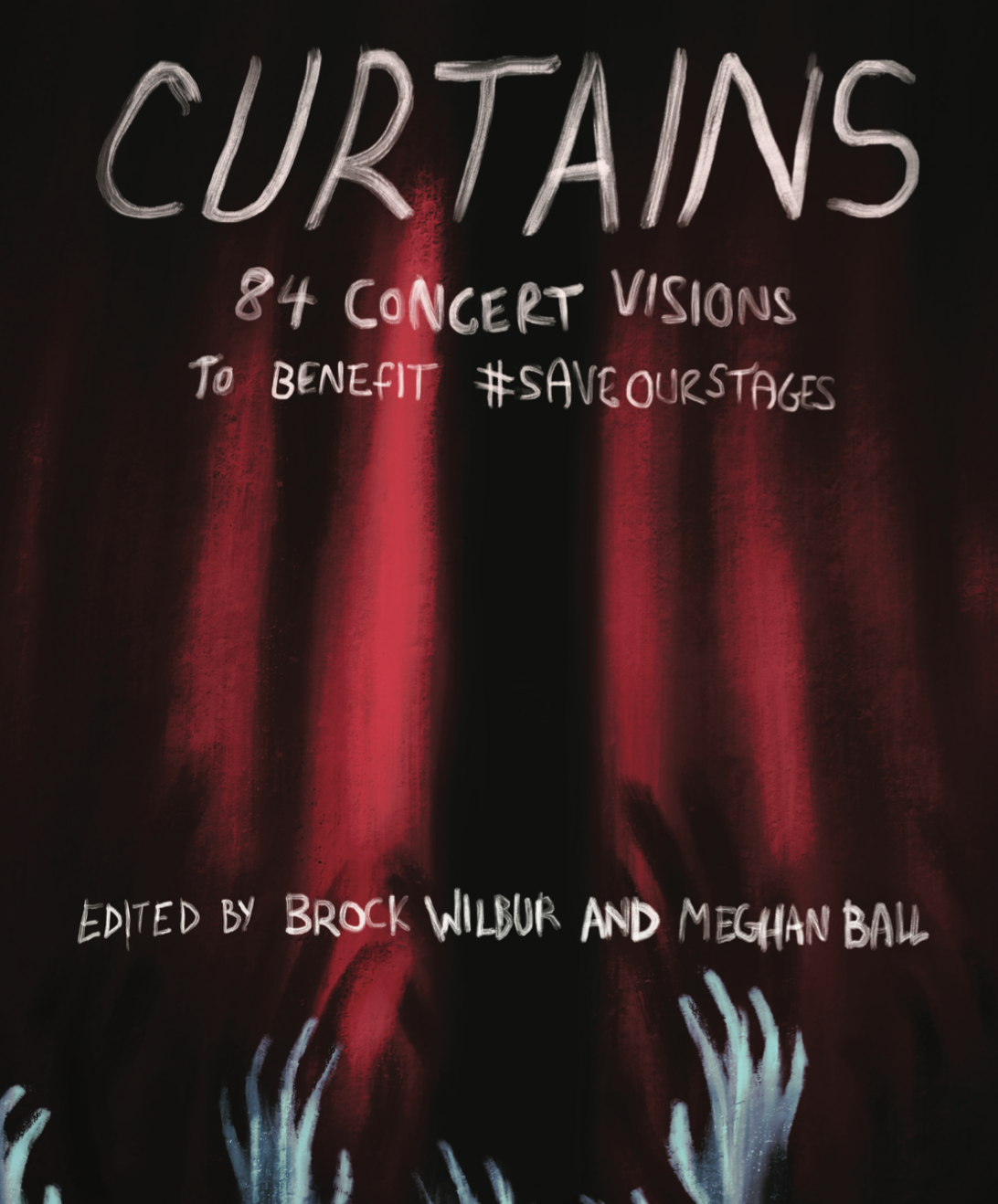Project Northwoods Update
As some of the more astute of you have noticed, I’ve been updating Project Northwoods with a fair degree of frequency on the website. The reasons for this are manifold, but basically boil down to one point: earlier last year I hired an editor to make sure that my typographical and literary errors weren’t so bad as to render the text incomprehensible. Over the scholastic break, I fixed the mistakes (and probably generated brand new ones) and updated the seven chapters that were already online so as to keep my readers (all three of you) up to date. And then I decided to add a couple more chapters and then I decided to not stop.
Project Northwoods, at the moment, is divided into three parts. Part One is the shortest by a long shot, at nearly half the length of the other two. I have two more chapters to post before I run up against the artificial boundary set up by myself. After that, I have to decide whether or not to continue posting chapters or just stop. I find myself coming back to a conversation I had with a friend awhile ago. When this website was but a glint in the milk man’s eye, I threw a question out to the Facebook hivemind: should I offer the book for free online, or only give out samples?
The basic idea was that if I offer a sample, people wouldn’t have to invest any money in it and can decide if they like it or not. Then, if and when I get a publisher, they can sink the money into it because they know they like how I write or they are thoroughly emotionally tied to Arthur or whatever. The other option was to post the whole thing and hope people would still be willing to buy a copy if there was ever a physical edition produced.
The conversation I had is lost to the much hated Timeline conversion (to which I responded with a resounding and furious “meh”), but it essentially boiled down to this: she felt I should get recognition and compensation for the work I had put into it. I wasn’t entirely sold on the concept. And then she said she liked the movie DOOM with the Rock and then I think I had to wash my hair or something. Or at least that was the excuse. I don’t truck with no DOOM movie lovers.
Long story short, I’ve revisited the story over the last couple of weeks and I’ve run into a couple of thoughts outside of “should I post more or not.” The first and probably most distracting is whether or not I am going to need to add more to part one. In more concrete terms than above, Part One runs roughly 55,000 words. This is a bit shy of an “average” book length of 80,000 words. Parts Two and Three are about 98,000 and 90,000 words respectively.
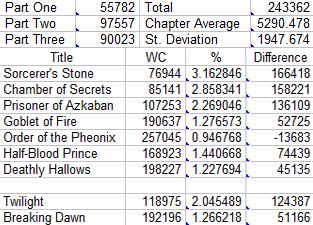
Yes, I compiled the data, why do you ask?
Now, between bouts of ever-so-cautious combing of mistakes in the text, I was trying to put myself in the shoes of a publisher. In putting myself in the role of someone willing to spend the money on an untested author, I went and thought of the best way to go ahead and maximize profit. In this regard, I looked at the manuscript and realized I have enough material for basically two full books and, with a little bit of effort, I could easily turn the remainder into another one.
So, would Project Northwoods work as a trilogy? Well, I think so. With a little extra work that is. Each third of the book functions very similarly to Joseph Campbell’s Hero’s Journey (if one can forgive the odious term). There’s the ordinary world, call to adventure, refusal of the call, rising action... erm... horse assault... return with the biscuits and gravy... and resolution. Or something. So it isn’t like the narrative would be hampered in any structural way.
The first problem is that I imagine Northwoods to be the first in a trilogy. And, no, this was never the original intention – it started as a play, remember. It was supposed to be a single story, but after I started fleshing out the world in my head, I realized there was a lot of potential room to expand with the characters. In any case, although a six book series is hardly unheard of, I’d rather keep Arthur’s adventure to one book. If subsequent stories end up splitting up into multiple volumes, well, I suppose I will cross that bridge when I come to it. Maybe it’s the novel’s stage play roots which hamper my ability to see this as anything but a contiguous story. While dividing book one into a series doesn’t hinder that in any way, it doesn’t really add anything to the experience.
The second problem kind of ties into that concept. I could indeed add a couple of additional chapters to Part One to make it more sufficiently novel-length. But I only have one idea for that particular “act” – Arthur’s ex-girlfriend is mentioned and discussed in a very brief section. When I started writing the novel, I was trying to keep the beats between the media as similar as possible. Dialogue has matured somewhat, but a lot of the substance is unchanged. There’s a running (or jogging) joke regarding Arthur’s ex, but that’s all she was useful for. Theoretically, I could jam in another chapter where Arthur goes to her apartment in an effort to reconcile with her and ends up spending more time with her roommate. There’d be an argument and Arthur would continue feeling like garbage.
See? It fits in perfectly: fish gotta swim, birds gotta fly, everyone gotta hate on Arthur.
A scene like this would add some world building and provide a look at the inner workings of other super villains in their homes. It would further illustrate the range of abilities of the Bestowed humans in the universe: after the chapter where Ariana’s incredibly useless power ruins an otherwise nice day at a café, having a character with another silly or otherwise useful ability provides further context and possible comic relief.
But does it add anything?
Therein lay the problem. As much fun as a scene like this could be, in the end it’s all just fluff. Fans may like it (that would assume I have fans), but I can’t help but get the feeling it would all end up almost masturbatory in nature. Plus, that’s just one chapter. Part One has chapters about 3-5,000 words in length. At best, it would fit comfortably in there but barely put a dent in the missing word count to bring everything to the golden number. At worst, it’s going to be a bloated mess and feel awkward due to its size if it is crammed in there. There’s a joke in there somewhere, but I’m not going to make it.
In any case, that particular scene is the only thing that makes sense to add. It keeps with everyone’s character while not egregiously upsetting the flow of events. Any other additions, I feel, would undermine the pacing and tone of Part One. Throwing in an extra fight scene would be silly and feel contrived. I’m probably in the minority in this, but if characters don’t have a reason to fight, it’s not that interesting. Mr. Plinkett says it best in Part Two of this review, but it bears repeating: the more the connection between the characters fighting, the more invested the audience is.
Take the Prologue’s 6000-plus word action extravaganza. Arbiter is defending New York against a walking battle tank that’s flattening huge chunks of territory. Civilians, heroes, and villains are all getting killed in the assault. It’s big, it’s bold, it’s life and death. Stakes are raised when children are left without parents and a prominent figure in American history is slain. Although we don’t know much about the hero and his opponent, they are archetypes in that grand Golden Age of Comic Books style – good versus evil with the very definition of civilization in the balance. It’s simplistic, but (I think) it works.
The next fight is much smaller scale, but can be compared to a police officer chasing down a potentially violent criminal. The character we focus on is young, inexperienced, and out of her league. But we know enough about her – her relationship with other heroes, her mother, her childhood hopes – that we still want to see her succeed. Her opponent and his fate also brings the heroine on a collision course with Arthur and his friend Tim.
A fight scene between these two would be preposterous and ruin any semblance of pacing I worked (fairly) hard on constructing. I suppose Arthur could walk by a hero and villain dueling in neutral territory as a staged fight, but how would Arthur get there? Why would he stop to watch the spectacle when he’s already in a bad mood? From whose perspective is this going to be in – a character we haven’t met and won’t see again except a cameo before I kill him? Because, let’s be honest, the guy pretty much has a death sentence the moment he appears in a story of mine. If this were a JRPG, he wouldn’t have a character portrait or anything.
I suppose it could work if Arthur watched the neutrals as much as the action, internalizing how the civilians watched the fight and didn’t notice little parts of the ruse – telegraphing attacks to minimize impact, putting more effort into shiny looking techniques than effective ones, etc. But even then, I wouldn’t want to stretch that out too far because of that damn pacing issue.
Finally, though, and possibly the biggest point, is that I’m not too comfortable with the idea of having more books just to earn a little extra profit. It seems incredibly insincere to write something as one discrete story only to turn around and expect someone two pay more than once to see how it ends. Remember my Stephanie Meyer’s Abstinence Saga: Breaking Dawn: The Part With the CGI Baby Monster: The Subtitling review? Well, in one of the haikus, there was mention how there wasn’t enough plot for two movies. While Project Northwoods doesn’t suffer from that problem (I have plot coming out of the walls, son), I can’t see that kind of division as anything other than a callous fleecing of a legion of fans. Of course, that sentence would imply I have fans too which, as my website statistics are prone to pointing out, I most certainly don’t.
Maybe this is just one of those things that prove I’m probably much too nice for my own good, seeing as how more potential books being sold would mean less likelihood of dying in a poorhouse somewhere. And seeing as how those goddamn Twilight movies made a squinteen gajillion dollars, clearly there is some merit to being a heartless money grubbing monster. But sticking to just one book could also prevent people from showing up and claiming that they’re my kid in the future.
So there’s kind of a benefit to not bilking people out of their money.
Kind of.
< PREVIOUS ENTRY • NEXT ENTRY >
Advice • Fiction • Gaming • General Musings • Reviews


